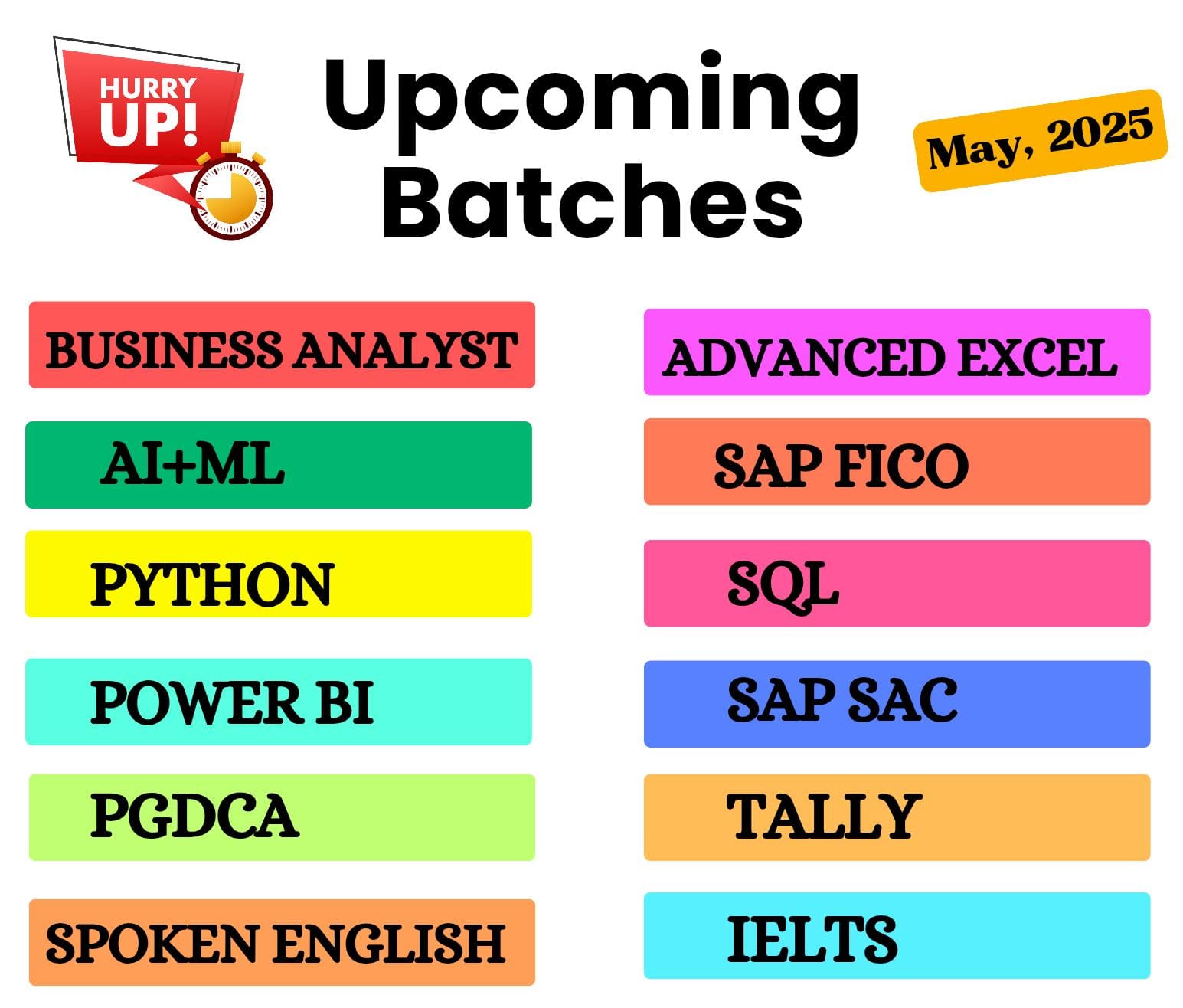Python
Course Overview
This course introduces the basics of web development using HTML. It covers the structure of web pages, essential tags, forms, tables, links, and multimedia integration. Learners gain hands-on experience in creating static web pages from scratch.
Objectives
- Understand Python syntax and semantics
- Write and debug Python programs
- Use functions, loops, and conditionals effectively
- Build small Python projects for practical learning
Trainer Names
- Padmavathi
- Pavan
- Akhilesh
Course Duration
1-2 months
Course Mode
Online & Offline
Curriculum
Core Python
Introduction to Core Python
- What is Python?: Introduction to Python and its features (easy syntax, interpreted, dynamically typed, high-level).
- Python vs Other Languages: Comparing Python with other programming languages (Java, C, C++).
- Setting up Python: Installing Python, working with IDEs like PyCharm, VS
Code, or Jupyter Notebook. - Basic Syntax: Python script structure, indentation, comments.
Data Types and Variables
- Basic Data Types: int, float, str, bool, complex.
- Variables: Declaring and initializing variables, dynamic typing.
- Type Conversion: Converting between different data types using functions like int(), float(), str().
- String Manipulation: Concatenation, slicing, methods like upper(), lower(), replace(), split().
Operators
- Arithmetic Operators: +, -, *, /, //, %, **.
- Comparison Operators: ==, !=, <, >, <=, >=.
- Logical Operators: and, or, not.
- Assignment Operators: =, +=, -=, *=, /=.
- Membership Operators: in, not in.
- Identity Operators: is, is not.
Control Flow
- Conditional Statements: if, elif, else.
- Loops:
- for loop (iterating over sequences like lists, strings, dictionaries).
- while loop (repeating actions based on conditions).
- Break and Continue statements.
- Pass Statement: Using pass for placeholder code.
Functions
- Defining Functions: Syntax, arguments, return values.
- Function Arguments: Positional arguments, default arguments, keyword arguments, variable-length arguments (*args, **kwargs).
- Lambda Functions: Anonymous functions using lambda.
- Recursion: Understanding and implementing recursive functions.
- Scope and Lifetime of Variables: Global vs local variables, global keyword.
Data Structures
- Lists: Creating lists, accessing elements, list slicing, list methods (append(), extend(), pop(), remove(), insert(), sort()).
- Tuples: Defining tuples, immutability, tuple unpacking.
- Sets: Creating sets, set operations (union, intersection, difference), methods (add(), remove(), discard()).
- Dictionaries: Defining dictionaries, key-value pairs, accessing values, dictionary methods (keys(), values(), items()).
- Comprehensions: List, set, and dictionary comprehensions for concise data transformation.
Strings
- String Operations: Concatenation, repetition, indexing, and slicing.
- String Methods: join(), split(), find(), count(), replace(), upper(), lower(), strip().
- Formatting Strings: Using f-strings, format(), and % for string formatting.
- Regular Expressions: Basic usage of re module for pattern matching and text manipulation.
Exception Handling
- Try-Except Block: Catching exceptions to handle errors.
- Multiple Except Clauses: Handling different types of exceptions.
- Else and Finally: Using else for successful execution, finally for cleanup.
- Raising Exceptions: Using raise to generate exceptions manually.
Modules and Packages
- Importing Modules: Understanding and using built-in modules (e.g., math, random, os).
- Creating Your Own Modules: Defining functions and variables in a separate file, importing into another script.
- Packages: Understanding how Python packages work and how to structure them.
- Python Standard Library: An overview of some important modules like datetime, os, sys, collections.
File Handling
- Reading Files: Opening files with open(), reading contents with read(), readline(), and readlines().
- Writing to Files: Writing data to files using write() and writelines().
- File Operations: Checking file existence, renaming files, deleting files using os module.
- Context Manager: Using with statement for proper file handling (automatic closing of files).
Object-Oriented Programming (OOP)
- Classes and Objects: Introduction to OOP, defining classes, creating objects.
- Instance Variables and Methods: Attributes and methods that belong to an instance of a class.
- Constructors: The __init__() method to initialize objects.
- Instance vs Class Variables: Understanding the difference and usage.
- Inheritance: Creating subclasses, overriding methods, and calling parent class methods.
- Polymorphism: Method overriding and method overloading.
- Encapsulation: Private and public members, getter and setter methods.
- Abstraction: Introduction to abstract classes and interfaces using abc module.
File Handling and I/O Operations
- Context Managers: Using with statement for file handling and managing resources.
- Binary Files: Reading and writing binary files.
- JSON, CSV, and XML Parsing: Reading and writing to different data formats.
- Error Handling with Try-Except: Advanced error handling and custom exceptions.
Modules and Packages
- Creating and Using Modules: How to write and structure Python modules.
- Packages: Creating Python packages, understanding __init__.py.
- Standard Library: Deep dive into modules like os, sys, itertools, functools, collections, time, etc.
- Third-Party Libraries: Installing and working with libraries using pip (e.g., requests, pandas, numpy, matplotlib).
Advance Python
Object-Oriented Programming (OOP)
- Classes and Objects: Introduction to OOP, defining classes, creating objects.
- Instance Variables and Methods: Attributes and methods that belong to an instance of a class.
- Constructors: The __init__() method to initialize objects.
- Instance vs Class Variables: Understanding the difference and usage.
- Inheritance: Creating subclasses, overriding methods, and calling parent class methods.
- Polymorphism: Method overriding and method overloading.
- Encapsulation: Private and public members, getter and setter methods.
- Abstraction: Introduction to abstract classes and interfaces using abc module.
Advanced Python Basics
- Advanced Data Types: Lists, Tuples, Sets, Dictionaries – Understanding deeper concepts like defaultdict, Counter, OrderedDict.
- List Comprehensions: Advanced usage with conditions and nested comprehensions.
- Generators and Iterators: Writing and understanding generator functions using yield.
- Decorators: Advanced decorator usage for modifying behavior of functions or methods.
- Lambda Functions: Understanding functional programming with lambda functions, map(), filter(), and reduce().
Object-Oriented Programming (OOP) Concepts
- Advanced Classes and Objects: Understanding class inheritance, multiple inheritance, method resolution order (MRO).
- Polymorphism and Abstraction: Implementing abstract classes and interfaces using abc module.
- Class Methods, Static Methods: Usage of @classmethod, @staticmethod decorators.
- Magic Methods: Customizing behavior of objects (e.g., __str__, __repr__, __init__, __call__).
- Properties and Getters/Setters: Using @property for better control over attributes.
File Handling and I/O Operations
- Context Managers: Using with statement for file handling and managing resources.
- Binary Files: Reading and writing binary files.
- JSON, CSV, and XML Parsing: Reading and writing to different data formats.
- Error Handling with Try-Except: Advanced error handling and custom exceptions.
Modules and Packages
- Creating and Using Modules: How to write and structure Python modules.
- Packages: Creating Python packages, understanding __init__.py.
- Standard Library: Deep dive into modules like os, sys, itertools, functools, collections, time, etc.
- Third-Party Libraries: Installing and working with libraries using pip (e.g., requests, pandas, numpy, matplotlib).
Concurrency and Parallelism
- Threading: Working with threads using threading module, synchronization using Lock, Semaphore.
- Multiprocessing: Understanding the multiprocessing module for parallel execution.
- Asyncio: Asynchronous programming with async/await, handling IO-bound tasks.
Testing and Debugging
- Unit Testing: Writing unit tests using unittest and pytest.
- Mocking: Using mock for testing dependencies.
- Debugging: Using the pdb debugger, logging best practices.
Version Control (Git)
- Basic Git Operations: Understanding Git commands (e.g., git clone, git commit, git push).
- Branching and Merging: Working with branches, handling merge conflicts
Advanced Python Features
- Decorators: Function decorators, @staticmethod, @classmethod.
- Closures: Nested functions and closures.
- Destructors: The __del__() method for object destruction.
- Context Managers: Writing custom context managers using __enter__ and __exit__.
Networking in Python
- Socket Programming: Understanding how Python works with sockets for communication.
- HTTP Requests: Working with HTTP requests using requests library.
- APIs: Building and consuming RESTful APIs.
Share This Course
Loved this course? Share it with your friends and network on social media!




